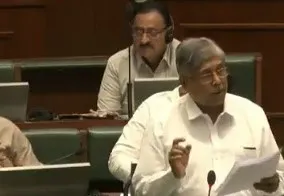What Actions Are Being Taken Against B.Ed Colleges in Maharashtra for NCTE Rule Violations?

Synopsis
Key Takeaways
- The NCTE has revoked recognition for 16 B.Ed. colleges in Maharashtra.
- Colleges have until July 22, 2025, to appeal the decision.
- New four-year B.Ed. curriculum introduced under the New Education Policy.
- Government is tackling illegal moneylending practices affecting farmers.
- 771 hectares of land have been returned to farmers in related cases.
Mumbai, July 16 (NationPress) Maharashtra's Higher and Technical Education Minister Chandrakant Patil announced in the Assembly that the National Council for Teacher Education (NCTE) has revoked the recognition of 16 B.Ed. colleges in the state due to rule violations.
Out of the 16 institutions, nine have ceased operations and are no longer admitting students.
Reports indicate that the remaining seven colleges had a total admission capacity of 500.
Minister Patil explained that the recognition for these seven colleges was rescinded because they failed to submit their evaluation report to the NCTE on time.
These institutions have until July 22, 2025 to file an appeal against the cancellation. If successful, they may re-enter the centralized admission process.
He further highlighted that a new four-year B.Ed. curriculum, known as the Integrated Teacher Training Program, has been introduced in line with the New Education Policy.
Patil's remarks came in response to inquiries from Shiv Sena MP Amol Khatal and BJP MLA Atul Bhatkhalkar.
In another matter, State Cooperation Minister Babasaheb Patil addressed ongoing issues of illegal land seizures by unlicensed moneylenders, stating these complaints will now be investigated at the District Collector level.
He noted that the state government has adopted a stringent approach towards reports of land grabbing, with 771 hectares of land being returned to farmers in these cases.
Minister Patil emphasized that it is illegal for unlicensed moneylenders to operate, urging them to adhere to legal interest rates and display these rates prominently. He assured that specific complaints regarding moneylenders and borrowers will be thoroughly investigated to ensure justice.









